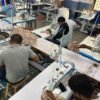India’s Hemp and Bamboo Advantage in a Post-Tariff World
The world is evolving, and so is the demand for sustainable and eco-friendly materials. As industries face new challenges, particularly with the shifting dynamics of global tariffs, India’s hemp and bamboo sectors stand out as promising solutions to the changing market needs. These natural fibers, known for their strength, versatility, and minimal environmental impact, are gaining significant traction in both domestic and international markets. The post-tariff world has created new opportunities for India, especially for industries looking to reduce their dependence on more expensive or tariff-impacted materials. In this new era, the hemp fabrics service industry in India is positioning itself as a key player in providing sustainable and eco-friendly alternatives. As global trade policies shift and sustainability becomes a priority, hemp fabrics are gaining recognition for their exceptional qualities, including their durability, biodegradability, and low carbon footprint. The rise of eco-conscious consumerism, alongside the redefinition of global trade rules, presents a perfect opportunity for India to capitalize on its hemp and bamboo advantages. For businesses looking to adopt greener practices, India’s custom service for hemp fabrics could be the game-changer they need to stay competitive in a world that increasingly values sustainability. The Growing Importance of Hemp and Bamboo in Sustainable Manufacturing Hemp and bamboo are fast emerging as critical resources in a world that is becoming more conscious of its environmental impact. These plants are not only renewable and biodegradable but also require minimal water and pesticide use, making them ideal for sustainable production. Hemp, in particular, has a long history of being used in textiles, but in recent years, it has seen a revival due to its eco-friendly properties. As countries look to reduce the ecological impact of their manufacturing processes, hemp is seen as an ideal material for a wide range of applications, from fabrics and ropes to eco-friendly packaging. India, with its favorable climate and long history of agricultural innovation, is positioned to lead the charge in hemp production. The hemp fabrics industry in India is growing rapidly, as both manufacturers and consumers are becoming increasingly aware of the benefits of this plant-based fabric. Furthermore, bamboo, with its ability to grow quickly and sustainably, is also playing a key role in the shift toward greener production methods. Why India’s Hemp and Bamboo Advantage Matters in a Post-Tariff World In the wake of changing global trade policies, especially with the introduction of new tariffs and trade barriers, India’s hemp and bamboo industries provide a strategic advantage. As nations re-evaluate their trade relationships, there is an increasing need for alternative materials that can offer quality products at competitive prices. Hemp, with its low environmental impact, meets the growing demand for sustainable solutions, and its production is becoming an important economic asset for India. The introduction of tariffs on traditional materials, particularly those made from petroleum-based fibers or less sustainable sources, has pushed industries to look for alternatives. India’s hemp fabrics service stands as a strong contender in this landscape, offering high-quality, affordable, and sustainable fabric options. These materials are not subject to the same tariff constraints that affect synthetic fabrics, which are often made from oil-based components. As a result, hemp fabrics from India can offer a cost-effective alternative to companies looking to reduce expenses while aligning with sustainability goals. Additionally, bamboo has long been celebrated for its sustainable attributes, growing rapidly without the need for pesticides or significant water usage. It also absorbs large amounts of carbon dioxide, making it an excellent choice for reducing overall environmental footprints. The post-tariff world creates an opportunity for India to lead in the custom service for hemp fabrics, offering businesses worldwide a reliable and eco-friendly option for their production needs. Key Benefits of Hemp and Bamboo Fabrics As global demand for sustainable products rises, both hemp and bamboo fabrics are quickly becoming popular alternatives to traditional textiles. Hemp, in particular, has a number of remarkable advantages that make it an excellent choice for businesses looking for environmentally responsible materials. Eco-Friendly Production: Hemp and bamboo require significantly fewer pesticides and fertilizers than cotton or synthetic fibers, making them much more eco-friendly in terms of production. The use of these fibers in manufacturing also reduces the overall carbon footprint of products. Durability: Hemp fabrics are known for their strength and longevity. Unlike traditional fabrics, hemp textiles are less likely to fray, shrink, or fade, making them a durable choice for long-lasting products. Biodegradability: Hemp and bamboo are both biodegradable, unlike synthetic fabrics, which often end up in landfills for hundreds of years. By choosing hemp fabrics for their production, companies can contribute to reducing waste and supporting a circular economy. Natural Insulating Properties: Both hemp and bamboo fabrics are known for their natural insulating properties, keeping the body cool in hot weather and warm in cooler conditions. This makes them perfect for a variety of products, from clothing to bedding. Versatility: Hemp fabrics can be used for a wide range of products, including clothing, accessories, home textiles, and even eco-friendly packaging. Similarly, bamboo is used in everything from textiles to flooring and furniture, providing a versatile solution to many industries. India’s Growing Role in the Global Hemp and Bamboo Market India’s agricultural and manufacturing sectors have long been a significant contributor to the country’s economy, and the country is now capitalizing on the global shift toward sustainability. The hemp fabrics service industry in India is one of the fastest-growing sectors in the country, driven by domestic demand and an increasing export market. As international markets turn to India for affordable and eco-friendly alternatives, India’s hemp and bamboo industries are well-positioned to supply these needs. The rise of eco-conscious consumerism, especially in developed countries, is increasing the demand for sustainable fabrics. India, with its vast agricultural resources and cost-effective manufacturing capabilities, is uniquely positioned to meet this demand, especially in a post-tariff world. Moreover, as countries tighten their environmental regulations, India’s custom service for hemp fabrics offers a sustainable solution that businesses can adopt to comply with new laws and consumer









